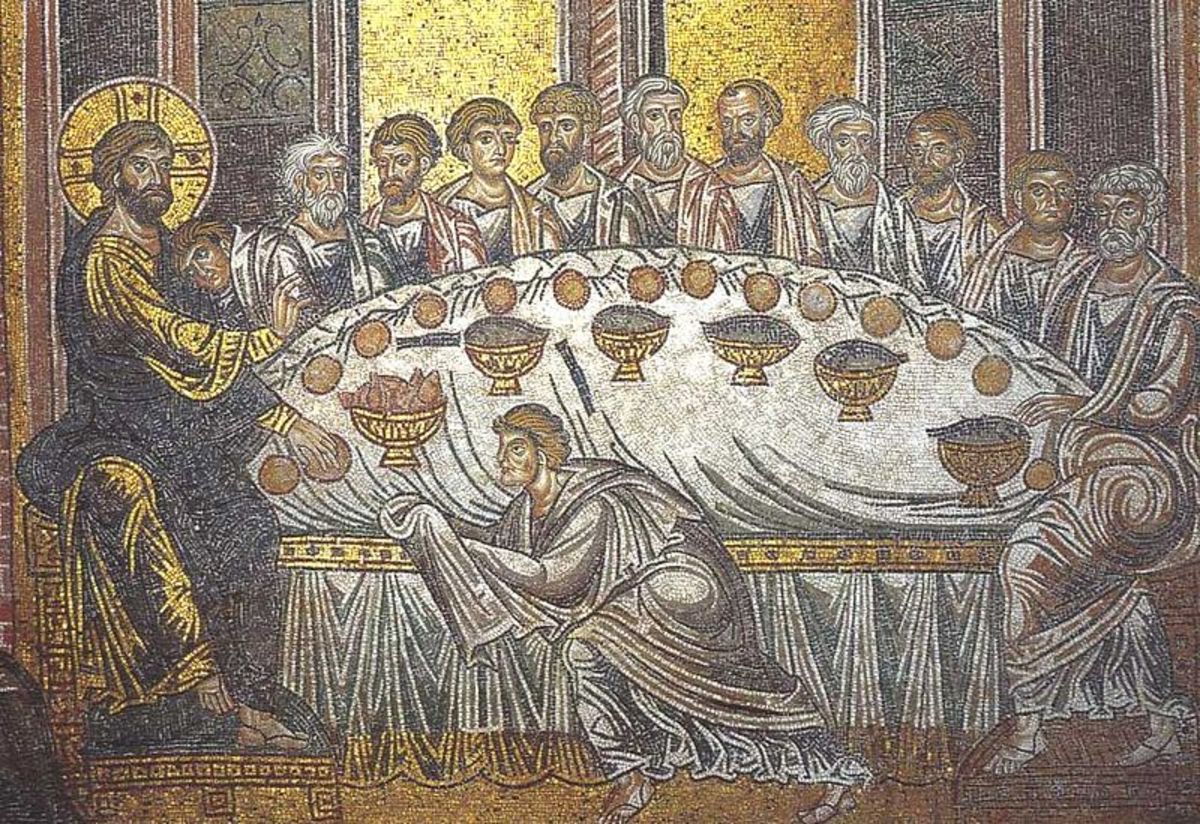Who May Administer the Lord's Supper (Lord's Supper, Episode VIII)

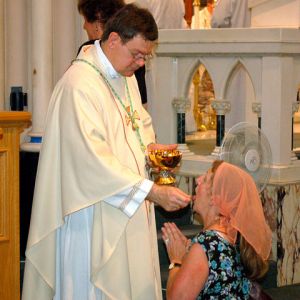
Authority to Administer
“The cup of blessing which we bless, is it not the communion of the blood of Christ? The bread which we break, is it not the communion of the body of Christ?” (Paul the Apostle, AD 55, 1Corinthians 10:16)
“Let that be deemed a proper eucharist, which is [administered] either by the bishop, or by one to whom he has entrusted it.” (Ignatius, AD 105, 1.89.90.)
God’s Word teaches us to view the books of the New Testament as the last will and testament of Jesus Christ. For, much as an heir has to comply with the terms of the testator’s will, we must be sure to obey the terms of our heavenly Father’s will, if we are to inherit the kingdom of God (Hebrews 9:16-181). It was in this sense that Jesus introduced the cup at supper saying, “This is my blood of the new testament” (Matthew 26:28).
It is a fundamental teaching of Scripture that the Lord Jesus entrusted the administration of his Last Will and Testament into the hands of His New Testament ministers. The Lord gave His apostles, and their successors, the power of attorney to administer His ESTATE which is predicated upon His broken body and shed blood. This grows more evident upon noticing that Jesus gave to Peter the “keys of the kingdom” (Matthew 16:18-192). Further, to all of the apostles, He said, “Whosoever sins ye remit, they are remitted to them; and whosoever sins you retain, they are retained” (John 20:23). In this declaration, Jesus is passing the administration of His last will and testament on to His disciples.
To further show that succession of His administrative authority was passed on to His disciples, James instructed us to “… Call for the elders of the church… Let them… Anoint him with oil in the name of the Lord:… If he has committed sins, they shall be forgiven him” (James 5:14-15). Notice that it is the ‘elders’ whom have the authority to anoint with oil. The end result (of the elders anointing with oil) is: “If they (the sick ones) have commented any sin it shall be forgiven them.” The sin in view here is the possible sin that caused the sickness. Further, the apostle Paul instructs the elders, whom he calls OVERSEERS, to feed “the flock of God” (Acts 20:28) and to minister “in Christ’s stead” (2 Corinthians 5:20). “In Christ stead,” does not mean as a replacement for Christ; but, as the representative (standing in/as the person) of Christ. Moreover, the same apostle references: “the bread which we break… The cup which we bless” (1 Corinthians 10:16). Here, Paul has the apostles of the our Lord in view when he uses the pronoun “we.” Since the authority of administrating the estate of Christ has been passed on through the line of God’s bishops and elders and since the eucharistic service is administering the estate of Christ (His body and blood), it is the bishop, elder, or pastor of the local assembly that has the primary biblical right to administer the Lord’s Supper. (This leaves those who would cause schisms in the Church, and who would separate the flock from their bishop, and who have no ordination, without any authority, whatsoever, to administer the Eucharist.)
In truth, it is Christ alone that feeds the flock, in the person of His ordained ministers. The event of the feeding of the five thousand (John 6:10-133) was a recalling of the messianic prophecy of Isaiah 40:11, “He shall feed his flock like a shepherd.” Also, it was a fulfillment of the prophecy concerning a prophet like unto Moses.4 Just as Moses fed the Israelites in the wilderness, so too, the Messiah fed the multitudes in this wilderness.
When Jesus instructed His disciples to take up the fragments that remained after all the people had eaten, and each one of the twelve took up a full basket (John 6:13), it was to presage their ministry of continuing to feed the flock of Christ through the Eucharist.
The feeding of the 5,000 is the only miracle (John uses the word “sign”) recorded in all four Gospels; most likely, because all concerned saw it as prefiguring the Lord’s Supper. Everything about this event speaks to the Eucharist.
First, the giving of thanks (v11) is the Gk “eucharisteesas” or eucharist.
Second, the word “fragment” (v12) is the Gk klasma which was used during the 1st and 2nd centuries of the Church to reference the bread of the Eucharist (Didache 9:3-45).
Third, the reference to “remain” (v12), Gk perisseuo (St’s #G4052) means to superabound (in quantity and quality), abundance, enough and to spare. Some Mss use the verb meno (St’s #G3306) which is in harmony with the corpus of John’s writings. Meno, is a special verb used by John to show permanency. Meaning: to stay, abide, continue, remain—as is translated here. John employs this verb, meno, in 15:11 “joy might remain”; 15:16 “your fruit should remain”; 1 Jn 2:14 “remain in you”. Here, the thought is: His broken body (klasmata—fragments) remains ever in relationship with His church. Compare 1:32-336 where John first employs this verb concerning the Holy Spirit abiding on Christ.
Fourth, there are the twelve baskets of fragments (v13). They each (twelve disciples) filled their baskets. Notice the delegation of ministry: 1. Jesus blessed and broke the bread (and fish) and delegated the administration to the twelve. 2. After which He instructed the twelve “ministers” to collect the “fragments.” They collected more that they had in the beginning. 3. So it is with Christ’s church. From the Words of Institution (Mt 26:26-28//Lk 22:19-20) and the teaching of the Apostle Paul (1 Cor 10:16) we learn that the administration of His body and blood have been placed into the hands of His ministers, and that the fragments “remain” ever.
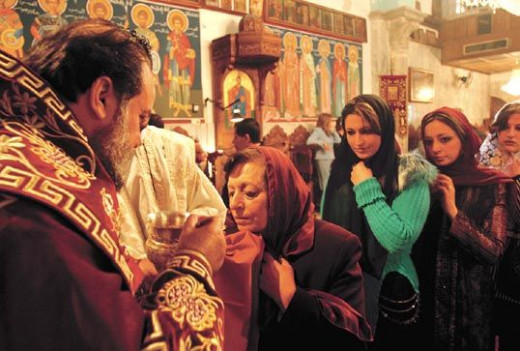

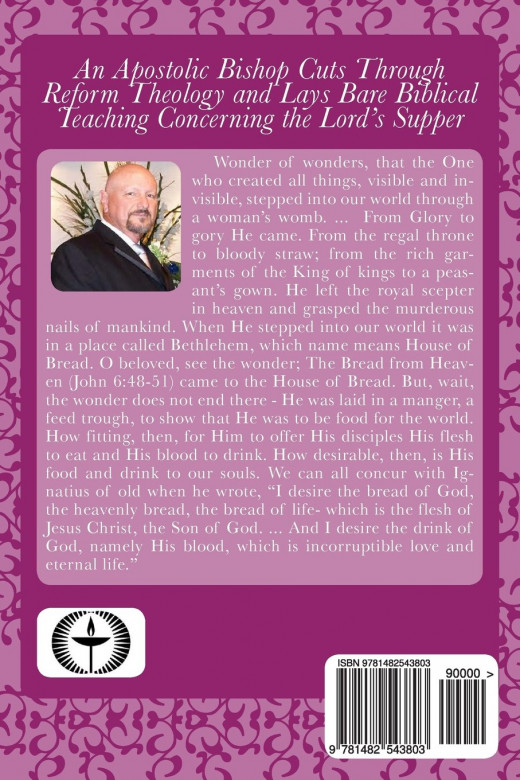
Character of the Minister
Another item must be addressed before we pass on. I have been asked by some, concerning the character of the minister serving the Eucharist. No man is perfect, but some have flaws that are more apparent that others. So, does an apparent flaw, touching ones character of holiness (pride, jealousy, spiteful, uncharitable, argumentative, etc., all sins for sure), disqualify one from administrating the Lord’s Supper?
I may not be able to answer this to everyone’s satisfaction; recognizing, as I do, the difficulty of receiving the body and blood of the Lord from the hands of one who does not have our confidence. The first thing I would point out, however, is the importance of acknowledging our own faults, and admitting that our judgement may be sinful in and of itself.7 Second, it is not the holiness of the minister that makes the elements holy. He is but an imperfect vessel, that, in that moment, is made acceptable in the eyes of the Beloved, just as we all are. (Who of us do not, if not verbally, at least in our minds, say: “Lord I am unworthy, but say the word and I will be healed?”) Thirdly, let us remember that, though the person may be imperfect, the office is holy, and that which comes from the office shares in that holiness. I would share, as an example, the Old Testament office of High Priest. The High Priest at the time of Christ’s crucifixion was Caiaphas, a co-conspirator in Jesus’ death. However, he prophesied a true prophecy under the influence of the Holy Spirit; not because he was a holy, or even a godly, man; but, solely because “he was high priest that year.”8 So, it is the holiness of the office of the Bishop/Pastor/Elder that is important, not the man.
“I wish to add something that is plainly awe-inspiring, but do not be astonished or upset. This Sacrifice, no matter who offers it, be it Peter or Paul, is always the same as that which Christ gave His disciples and which priests now offer: The offering of today is in no way inferior to that which Christ offered, because it is not men who sanctify the offering of today; it is the same Christ who sanctified His own. For just as the words which God spoke are the very same as those which the priest now speaks, so too the oblation is the very same.”9
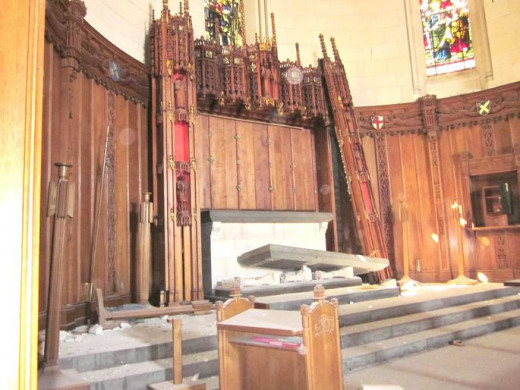
Our Present Sad Condition
Having said that, I must address a sad condition of the Lord’s church and offer a solution. Very few Evangelical/Pentecostal congregations today have the availability of the Lord’s altar. Many pastors only offer the communion monthly, or quarterly, and some only annually. And when they do, it is only as a memorial of Christ’s death; they, themselves, not believing in the Real Presence. Therefore, it is not a real Sacrament that is offered, but a mockery. It has not been long ago that the author was ministering in a large church, in the midwest of the United States, that had not been offered Holy Communion for ten years. This sin, committed by the Lord’s ministers, is inexcusable. This author does not stutter when he says, If the Lord’s Table is not made available to the saints on a biblical regularity, a church does not exist—in any biblical sense of the word. A choir, an orchestra, an orator, an elder board, and an offertory do not make a Christian church, if the Lord’s body and blood are not made available to the people for whom He died.
What is to be done? If the pastors have neglected the Lord’s Table, the Christian families must take the matter into their own hands. The saints are said to be a “nation of kings and priests unto God” (1 Peter 2:910). Therefore, there is a very real sense in which the head of each home is the high priest of that home. There are groups that stand in true apostolic succession, such as the Disciples of the Way (Apostolic) which advocate house church venues for the people of God, where the spiritual head of the household is appointed to officiate at the Lord’s table for the family, and has as their spiritual covering the Abbott General of the Disciples of the Way (Apostolic). The Disciples stands ready to assist any who want to follow the Scripture in this ordinance. I know I have the mind of Christ on this, so I make no apologies to the pastors who are willfully neglecting the Lord’s Table; and as a consequence of that sin, not feeding the Lord’s flock, which He purchased with His own blood (Acts 20:2811).
Apostolically Speaking
☩ Jerry Hayes
Footnotes
1He 9:16-18 For where there is a testament, there must also of necessity be the death of the testator. 17 For a testament is in force after men are dead, since it has no power at all while the testator lives. 18 Therefore not even the first covenant was dedicated without blood.
2 Mt 16:18-19 And I also say to you that you are Peter, and on this rock I will build My church, and the gates of Hades shall not prevail against it. 19 And I will give you the keys of the kingdom of heaven, and whatever you bind on earth will be bound in heaven, and whatever you loose on earth will be loosed in heaven.” See Mt 18:18.
3 Jn 6:10-13 Then Jesus said, “Make the people sit down.” Now there was much grass in the place. So the men sat down, in number about five thousand. 11 And Jesus took the loaves, and when He had given thanks He distributed them to the disciples, and the disciples to those sitting down; and likewise of the fish, as much as they wanted. 12 So when they were filled, He said to His disciples, “Gather up the fragments that remain, so that nothing is lost.” 13 Therefore they gathered them up, and filled twelve baskets with the fragments of the five barley loaves which were left over by those who had eaten.
4 De 18:18 I will raise up for them a Prophet like you from among their brethren, and will put My words in His mouth, and He shall speak to them all that I command Him.
Cf Ac 3:20-22 And that He may send Jesus Christ, who was preached to you before, 21 whom heaven must receive until the times of restoration of all things, which God has spoken by the mouth of all His holy prophets since the world began. 22 For Moses truly said to the fathers, ‘The Lord your God will raise up for you a Prophet like me from your brethren. Him you shall hear in all things, whatever He says to you.
5 Didache 9;3-4 And concerning the broken (klasmaton - fragment) bread (no word in Gk text for bread): We thank You, our Father, for the life and knowledge which You made known to us through Jesus Your servant. To You belongs the glory for ever."
9:4 As this broken (klasma - fragment) bread (no word in Gk text for bread) was scattered over the mountains, and was brought together to become one, so let Your church be gathered together from the ends of the earth into Your Kingdom, for the glory and the power are Yours through Jesus Christ forever.
6 Jn 1:32-33 And John bore witness, saying, “I saw the Spirit descending from heaven like a dove, and He remained (meno, St’s #G3306) upon Him. 33 I did not know Him, but He who sent me to baptize with water said to me, ‘Upon whom you see the Spirit descending, and remaining on Him, this is He who baptizes with the Holy Spirit.’
7 Mt 7:1-5 “Judge not, that you be not judged. 2 For with what judgment you judge, you will be judged; and with the measure you use, it will be measured back to you. 3 And why do you look at the speck in your brother’s eye, but do not consider the plank in your own eye? 4 Or how can you say to your brother, ‘Let me remove the speck from your eye’; and look, a plank is in your own eye? 5 Hypocrite! First remove the plank from your own eye, and then you will see clearly to remove the speck from your brother’s eye.”
8 Jn 11:49-52 And one of them, Caiaphas, being high priest that year, said to them, “You know nothing at all, 50 nor do you consider that it is expedient for us that one man should die for the people, and not that the whole nation should perish.” 51 Now this he did not say on his own authority; but being high priest that year he prophesied that Jesus would die for the nation, 52 and not for that nation only, but also that He would gather together in one the children of God who were scattered abroad.
9 John Chrysostom, "Homilies on the Second Epistle to Timothy," 2,4, c. 397 A.D.
10 1 Peter 2:9 But you are a chosen generation, a royal priesthood, a holy nation, His own special people, that you may proclaim the praises of Him who called you out of darkness into His marvelous light;
11 Ac 20:28 Therefore take heed to yourselves and to all the flock, among which the Holy Spirit has made you overseers, to shepherd (feed —KJV) the church of God which He purchased with His own blood.
Read More From the Bishop On the Eucharist
- The Lord's Supper (From the Beginning)
This article is the introduction to a series on the Lord's Supper. Jesus instituted this covenant meal and commanded its observance. Here we review the teachings of those whom the apostles taught. - What Is the Lord's Supper, Episode II
In this writing the author gives a brief description of the different terms used by Christians to describe and identify the sacramental meal Christ instituted the night before His death. - Breaking Bread (The Lord's Supper, Episode III)
This writing establishes the biblical phrase "Breaking Bread" as a discriptive name for the Lord's Supper. - The Christian Altar (The Lord's Supper, Episode IV)
As one searches the New Testament for a reference to the Christian altar, it comes as a shock to evangelicals that the Lord's Table is the only New Covenant altar mentioned. Here, we declare it so. - Who May Partake of Holy Communion? (The Lord's Supper, Episode V)
The question of "Who may Partake of holy Communion" is explained by this writing. Some churches practice "open communion", while others practice "closed Communion." Which is biblical? - Is The Lord's Supper Salvific? (The Lord's Supper, Episode VI)
This article reviews the question; Is partaking in holy Communion necessary for salvation? - How Often Should the Lord’s Supper be Observed? (Episode VII)
With the many different practices of Eucharistic observance in Christianity it may be a challenge to know what the biblical frequency is; this article seeks to present the biblical view. - The True Elements (Lord's Supper, Episode IX)
This article covers the question as to the nature of the biblical elements of the Lord's Supper. Christians are divided over leavened or unleavened bread; fermented or unfermented fruit of the vine. - Are Symbols Important to God (A Study in the Lord's Supper, Episode X
In this study we examine the importance of biblical symbols, especially in relation tot he holy Communion. - Bishop's Epistle: The Real Presence (Lord's Supper, Episode XI)
The Book You Ought To Read





